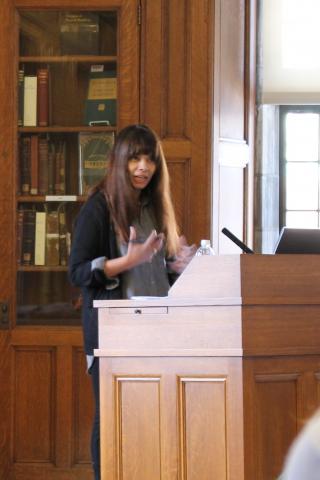
Professor Seshadri’s new work on “posthuman economics” picks up where her recent study, HumAnimal (Minnesota, 2013) left off. Posthuman economics is a new coinage and field of study that aims to make an intervention in both posthuman studies and economics.
Traditional economics, Seshadri suggested during her lecture for the Humanities Center’s “Posthumanities” series, conceives of the global economy as a vast inhuman machine. The mechanistic formulations of classical economics provoked a progressive response in the 1970s, with the emergence of a sub-field within economics known as “humanistic economics,” among whose key advocates were Mark Lutz and Keith Hart. Humanistic economics aimed to posit human beings as actors motivated not only by self-interest, but by an idea of common welfare.
But humanistic economics remains perhaps too anthropocentric given the prospect of ecological collapse. Rather than humanizing the economic system, then, Seshadri suggests we need an immanent critique of economics. Thus, Seshadri’s posthuman economics can model what she describes as an ethos of “biocentric humility”
The economic crash of 2008 is a key starting point for many of the progressive critics of the global financial system cited in Seshadri’s subsequent outline of the contours of posthuman economics. Along these lines, Prof. Seshadri approvingly cited Richard Heinberg, founder of the Post-Carbon institute, Matt Taibbi, author of Griftopia, and a 1966 essay by Kenneth Boulding called “Notes on the Coming Spaceship Earth.”
Seshadri was quite critical of the idea of “environmental economics,” represented by strategies like cap and trade and popular in the mainstream environmentalist movement (i.e., Al Gore’s An Inconvenient Truth – a film Seshadri argues is actually insidious and unhelpful for sincere environmentalists). These are at best part-measures and at worst policies that give polluting industries a license to continue polluting. Rather than “sustainable growth,” Seshadri suggests we should look seriously at the works of European theorists exploring “de-growth” – an ideology that breaks free of the teleologies of both Marxist and pro-capitalist ideologies to argue that shrinkage and reduction, rather than endless growth, may be the only path towards a true biocentric praxis.
